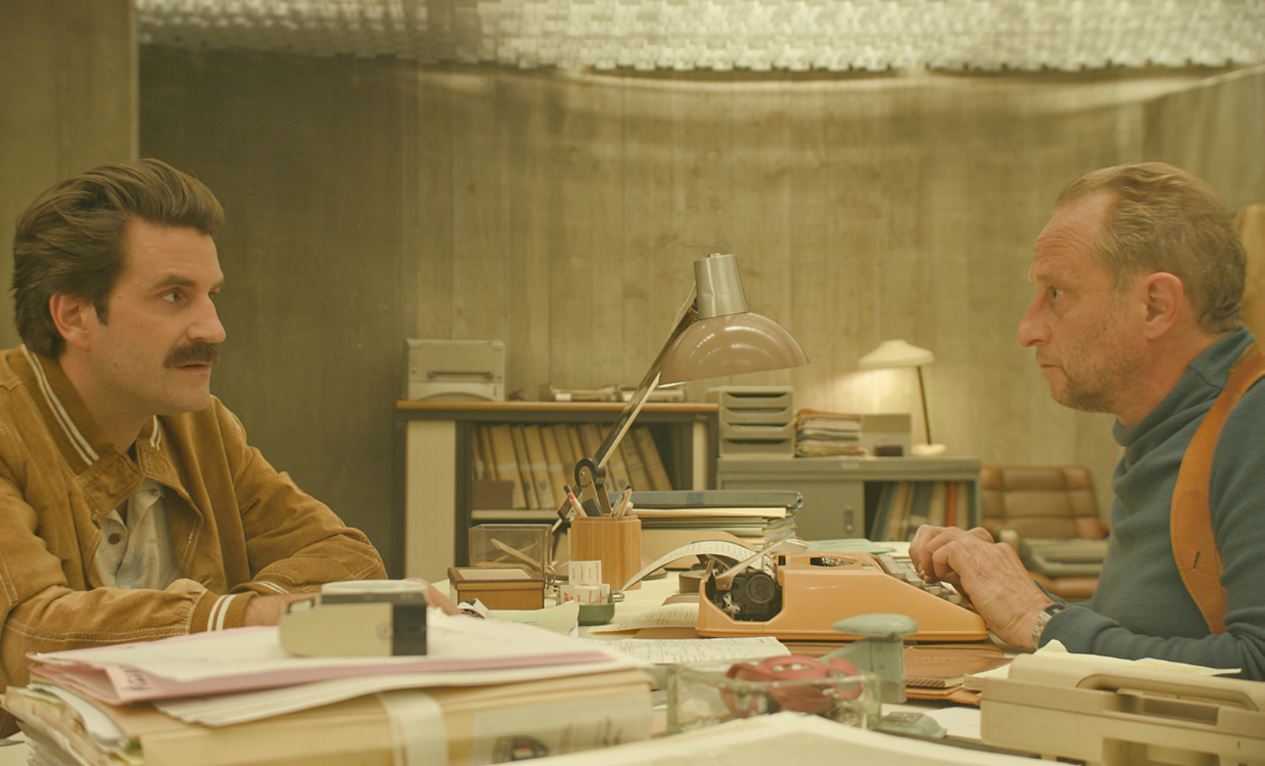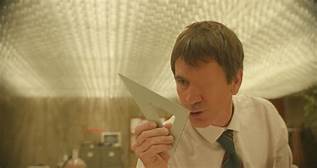The French title of Quentin Dupieux’s latest film, KEEP AN EYE OUT, relies on a clever bit of wordplay in its two words, AU POSTE. One of the meanings of poste is police station, where the action takes place. Another is post, as in taking up one’s post. There are more, the translation of which might give too much away of this wickedly absurd game of perception, memory, and extraneous oysters. The English translation is a fine simulacrum of that wordplay, what with one of the characters inhabiting this absurdist effort having just the one eye, and his superior officer demanding that he use it to make sure a suspect doesn’t leave his interrogation prematurely.
With a running time that barely qualifies it as a feature-length narrative, everything from the dialogue to the 70s vibe delights and confounds the audience with a wild abandon that never stooping to anything so bourgeois as mere storytelling This is an exercise in in puns of all types, as well as excoriating genre tropes. The plot is the merest excuse to indulge in a meta-oeuvre, one that dissects film vocabulary and syntax using a satire of startling precision and obvious affection for the art form.

Benoît Poelvoorde, Grégoire Ludig,
Dupieux begins with a non-sequitur, a man in a red speedo conducting an outdoor orchestra attired in more traditionally formal attire. The music swells in time to the opening credits, and continues even as the conductor flees, pursued by the police. What does it all mean? Everything and nothing. Amusing and confusing. It exists as its own perfectly self-contained vignette before we join Commissaire Buron (Benoît Poelvoorde) and Louis Fugain (Grégoire Ludig) who will carry the film forward. The former is a world-weary police detective currently on the phone trying to synch schedules with a friend while the latter, a hapless murder suspect, waits for him to finish. As we listen, we learn that Fugain is very hungry and that the decedent in question was the first corpse he has ever seen. We also learn that that the only concession Buron is willing to make is to offer Fugain a half-eaten candy bar of dubious vintage pulled from the morass of his desk drawer. As they settle down to a long night of interrogation, Fougain’s flashbacks about what led up to discovering the dead man are continually invaded by the people he will meet later at the police station, people who bombard him with questions and offer commentary on the relative quality of the action.

Marc Fraize
Figuring prominently among them is Phillipe (Marc Fraize), the less that sharp, one-eyed underling tasked with watching Fugain as Buron steps away for dinner with his son. When Fugain makes the mistake of trying to engage the callow young man in small talk, Phillipe, who loves his work a little to much, launches into a dissertation on police procedures that ends in tragedy foreshadowed. That it involves a triangular drafting tool, a protractor’s pointier and more dangerous cousin, not usually found among the detritus of a police detective’s desk is. Immaterial aside from its necessity as the punch line in a joke that puts the first twist in this wonderfully twisted tale.
As the night drags on, clichés, homages, and pretentious writing are skewered as the story slips the fetters of logic and moves into painful metaphor played for laughs. By the time Fugain chomps down on the shell of the oyster Buron offers him, Dupieux has primed us for anything, and with Machiavellian glee, he delivers a dénouement to this gambol through semiotics that is perfection itself.
Your Thoughts?